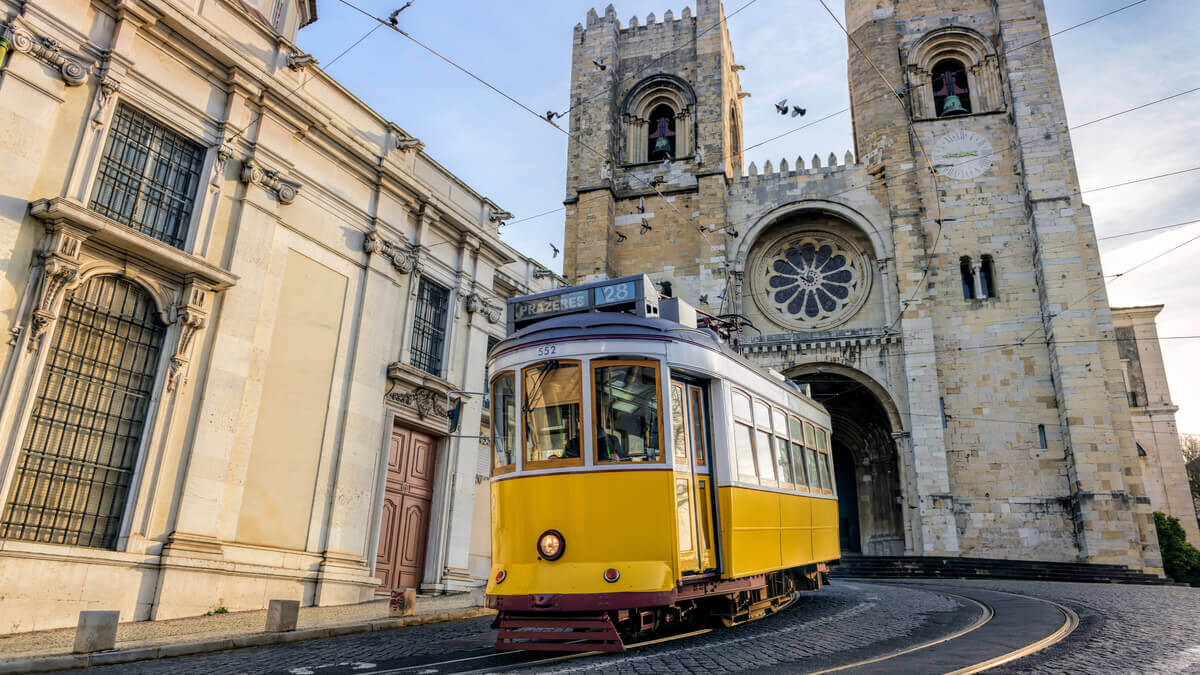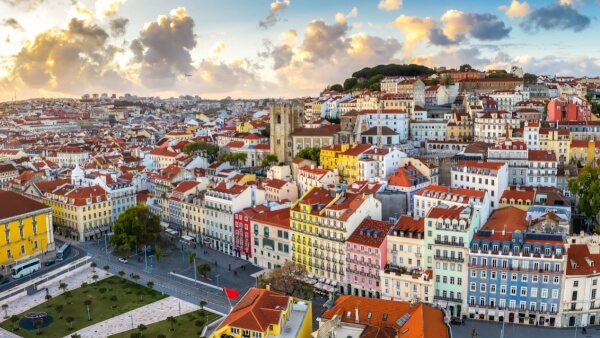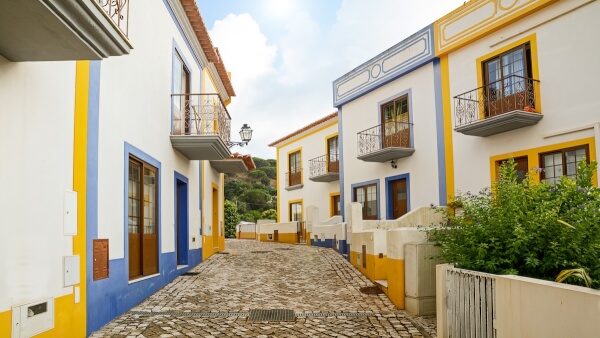Renovating a house in Portugal: Costs, permits, and more (US guide)
Thinking about renovating a house in Portugal? Find out the average costs, required permits, and more in this guide.

Portugal has pulled in many American expats over the last few years.
With visa initiatives for remote workers and investors, it's easy to see why so many are thinking about moving to Portugal from the US. The country offers affordable living compared to Western Europe, a mild climate, and a high quality of life.
If you're considering life abroad in Portugal, you probably want to know how visas work, what housing costs in different cities, how to access healthcare, and if there are any catches to expect.
Here's a practical guide on moving to Portugal from the USA.
We'll also introduce Wise — your international money transfer alternative. Use Wise to send stress-free transfers to over 140 countries - all at the standard mid-market exchange rate.
Portugal sits on Europe's western edge, bordered by Spain and the Atlantic Ocean.
It offers European infrastructure with lower costs than most Western European countries, and a relatively easy path to Portuguese citizenship for expats who qualify.
Here are a few quick facts:
| Capital | Lisbon |
|---|---|
| Language | Portuguese |
| Population | 10,403,784¹ |
| Currency | EUR |
| Government type | Semi-presidential republic |
| Religion | Predominantly Roman Catholic |
| Weather | Mediterranean climate with hot, dry summers and mild, rainy winters |
| Tax treaty | Yes |
Life in Portugal moves more slowly than most Americans expect. This relaxed pace has a lot of appeal, with less stress, longer lunches, and more emphasis on relationships than efficiency.
But it can also be frustrating, especially when you're new. You may have to deal with rescheduled appointments, paperwork taking months instead of weeks, and, generally speaking, things being more laid-back than in the US.
US citizens can visit Portugal for up to 90 days within any 180 days with just a valid passport.² To live there longer, you need to get an appropriate visa type.
There are a few different pathways depending on your situation, including passive income, remote work, business ownership, or employment. Most visas also let you bring family members.
After living in Portugal with proper residency for enough years, depending on your visa category, you can usually apply for permanent residence and eventually even become a Portuguese citizen.
The D7 visa is for Americans who get passive income from pensions, rental properties, dividends, or investments. The idea is that you don't work in Portugal, but live off the income generated elsewhere.
Minimum income requirements are 760 EUR monthly for a single person or 1,140 EUR for a couple. Each dependent you bring needs an additional 228 EUR of monthly income. Make sure to check these numbers at the time of your application, since they change regularly.
You'll need to prove that this income arrives regularly and transfer it to a Portuguese bank account.
Portugal's digital nomad visa is for remote workers earning income from foreign employers or clients.
It has 2 versions:
- D8 Lite: Lasts 1 year (extendable for 6 months) and requires 2,820 EUR monthly income plus 4 months of accommodation proof, but no Portuguese bank account
- D8 Plus: Lasts 2 years (renewable for 3 years) and requires 2,820 EUR monthly income, 8,460 EUR in savings, a Portuguese bank account, and a 12-month lease
Both versions allow you to combine multiple income sources to meet the threshold.
The Golden Visa program grants you residency through an investment in Portugal's economy.
| 💡 Many Americans used to get a long-term residence permit in Portugal through the real estate investment option, but it's not available anymore. |
|---|
Instead, you can invest in the following:⁴
- Fund subscription: Invest 500,000 EUR in qualifying Portuguese investment funds or venture capital
- Job creation: Create at least 10 new full-time jobs in Portugal
- Business investment: Invest 500,000 EUR in an existing Portuguese business
- National heritage donation: Donate 250,000 EUR to Portuguese arts, culture, or national heritage projects
- Research and development: Invest 500,000 EUR in Portuguese research activities
The Portuguese Golden Visa program has been going through some changes in recent years, like many Golden Visa programs in the EU.
But it's still an attractive option for Americans with sufficient funds that eventually can qualify them for a Portuguese passport.
The D2 visa works for Americans who own businesses or actively invest in companies. It targets entrepreneurs, freelancers, and independent service providers who want to establish businesses in Portugal.
You need to invest in a company's share capital, with immigration advisors suggesting at least 50,000 EUR. That said, larger investments improve your approval chances.
You must also prove financial ability to support yourself while living in Portugal.
Young entrepreneurs with innovative business ideas can use the Startup Visa. This targets founders developing technology-focused companies with growth potential.
Requirements include:
- Intent to develop innovative goods and services
- Technology or knowledge-based business model
- Potential to create qualified employment
- Projected turnover exceeding 325,000 EUR within 5 years after incubation
- Projected assets exceeding 325,000 EUR within 5 years
Your startup needs endorsement from a Portuguese incubator or accelerator that certifies that your business plan meets innovation criteria.
The Tech Visa can be a workable option for tech workers who have job offers from Portuguese tech companies.
You need a bachelor's degree or equivalent level 6 qualification according to ISCED 2011 standards. Without a degree, you need level 5 tertiary education plus 5 years of experience in specialized technical functions.
| 💡 Portuguese tech companies use this visa to hire foreign talent when they can't fill positions locally. |
|---|
The HQA visa fast-tracks highly qualified professionals working in research and development. You collaborate with recognized Portuguese research institutions to drive innovation in scientific or technical fields.
The investment requirement is 175,000 EUR, which is much lower than the Golden Visa. You must actively manage this investment to build your business in Portugal.
If you're moving to Portugal to study full-time at a university, you'll qualify for a student visa.
You'll just need to prove that you've been accepted at a qualifying school and that you have enough funds for tuition and living expenses.
One of the reasons why Portugal remains a popular destination for US expats is the fact that it has a high quality of life, but costs well below many other Western European countries.
Overall, living in Portugal is 28% less expensive than in the US.⁵
That said, some expenses have climbed recently. Specifically, rental costs have been rising in cities like Lisbon and Porto. Still, rent averages almost 38% lower than in the US.⁵
Here's what common expenses look like:
| Expense | Cost⁵ |
|---|---|
| 1-bedroom apartment (city center) | 896 EUR |
| 3-bedroom apartment (city center) | 1,489 EUR |
| Meal at inexpensive restaurant | 12 EUR |
| Meal for 2, mid-range restaurant (3 courses) | 45 EUR |
| Monthly transport pass | 40 EUR |
| Utilities | 115 EUR |
| Internet | 37 EUR |
| Mobile phone plan | 18 EUR |
| Toyota Corolla (or equivalent new car) | 34,060 EUR |
| International school (annual per child) | 10,580 EUR |
To help you estimate, a family of 4 needs around 2,426 EUR monthly, plus rent, to live comfortably in Portugal. If you're just one person, expect to spend about 671 EUR monthly, excluding rent.⁵
Portugal has a reputation for being affordable, but keep in mind that local salaries match these lower costs. The average monthly net salary after tax is just 1,122 EUR.⁵
In other words, if you're working for a Portuguese company or depending on local income sources, your budget might be tight.
But if you're earning a US salary remotely, receiving pensions or passive income, or otherwise bringing foreign money into the country, you can enjoy a very nice lifestyle.
You'll need a bank account to handle daily expenses, so it's important to open one as soon as possible once you enter Portugal. To do that, you'll typically need:
- Valid passport
- NIF (Portuguese tax number)
- Proof of Portuguese address (rental contract or utility bill)
- Residence visa or permit documentation
- Proof of income or employment
Many US citizens open Portuguese bank accounts at expat-friendly banks with English services, such as Millennium BCP, Novobanco, and Santander.
That said, even with a Portuguese bank account, multi-currency accounts like Wise can simplify spending and transfers, especially when you're moving money between the US and Portugal or managing finances in both USD and EUR.
It may surprise you, but you'll have to deal with US taxes even if you're living in Portugal full-time. In other words, you'll have both US and Portuguese taxes to think about.
| 💡 Let’s take a look at a quote from an expert on the Liberty Atlantic team: | |
|---|---|
“Taxes in Portugal are becoming increasingly complicated for Americans these days, particularly those on the now-sunset Non-Habitual Residence (NHR) program,” says Ricardo Jesus, Financial Advisor at Liberty Atlantic Advisors. “Many Americans moved here for early or standard retirement and have not planned for what happens after the 10-year eligibility period is up. There is also a lot of fear in general around Portuguese taxation, which is fair, because our rates do go much higher than those in the U.S.. However, with proactive planning, it is possible for Americans currently on NHR to remain in Portugal after NHR has ended, without accepting a reduction in their lifestyle.” |
You become a Portuguese tax resident if you spend more than 183 days in Portugal during a year or establish your habitual residence there.
Residents pay tax on worldwide income using progressive rates up to 48%.
If you're a non-resident, you'll pay a flat 25% tax on your Portuguese-source income only.
| However, if you're living in Portugal full-time, you'll most likely be seen as a resident for tax purposes, so be prepared to pay pretty high taxes. |
|---|
The US taxes citizens on worldwide income even if you don't live there, so you'll still need to file a tax return with the IRS every year.
However, Portugal and the US have a tax treaty that helps prevent double taxation.
You can also use the Foreign Earned Income Exclusion or foreign tax credits to offset US taxes with taxes paid to Portugal.
| But regardless of how much you owe in US taxes, even if you owe nothing, you still have to file your return every year. |
|---|
Just like in most countries, you have a choice between renting or buying a property in Portugal. Many Americans rent first to learn different neighborhoods and the market before committing to a purchase.
Portugal's rental market has been competitive, especially in Lisbon and Porto, with rising costs and limited inventory.
However, the market started cooling in late 2025. In the second quarter of 2025, each available rental received an average of 17 inquiries, which is a 43% drop from the same period in 2024.⁷
Despite the competition, rent still costs much less than in most US cities.
The requirements to rent an apartment or a house are pretty standard.
You'll typically need a deposit equal to one or two months' rent plus the first month upfront. Sometimes, landlords may also ask for proof of income.
Many Americans in Portugal use local Facebook groups to find listings.
You can buy property in Portugal, but it's important to first spend some time understanding the country and the local markets. Prices, neighborhoods, and property conditions can all look very different depending on your city or region.
As a foreigner, you may be able to qualify for a mortgage from a Portuguese bank. However, be prepared for a large down payment—usually, anywhere between 30% to 40%.⁶
Interest rates will often be higher than for Portuguese citizens, too.
Portugal offers both public and private healthcare.
Americans with residency can access the public system (Serviço Nacional de Saúde or SNS) by registering at their local health center with a residence card, tax number (NIF), and ID.
The SNS assigns you a family doctor for primary care and covers specialist visits, emergency services, hospitalization, and subsidized medications.
Co-payments are pretty low, usually between 5 EUR and 20 EUR per visit.⁶
However, wait times for non-urgent specialist care can be long in the public system. This is why many Americans buy private health insurance for faster access and convenience.
| Private health insurance is still less expensive than in the US, with monthly premiums usually costing between 40 EUR and 200 EUR.⁶ |
|---|
Portugal’s capital is home to a large part of the expat community. The city is on the Southwest coast of Portugal and has a great mix of modern and historic neighborhoods, which means you’ll be able to find a location that suits you and your family’s needs.
Housing costs more than in other Portuguese cities, but the job market is stronger, too. You also get many cultural amenities, nightlife, and easy access to beaches.
The second-largest city in Portugal, Porto, has a UNESCO heritage status and is a popular tourist draw. In the north of the country, Porto is another great place for expats with a range of housing options and types.
The expat community is smaller but growing, particularly among digital nomads and American retirees.
Aveiro is a quieter choice if you’re looking for a place to live in Portugal without so many tourists. It’s family-friendly and has had a lot of investment in recent years. That means that despite being in the center of the country, it has great links to the cities of Lisbon and Porto.
Portugal consistently ranks as one of Europe's safest countries. Violent crime is rare, and most neighborhoods feel safe day and night.
It's also a welcoming and safe country for LGBTQ+ people. Same-sex marriage has been legal since 2010, and there are many communities and events, especially in larger cities like Lisbon and Porto.
Many Americans consider moving to Portugal for affordable and high-quality European living. It can be a great option if you want to be on the coast yet still close to the rest of Europe.
However, just like with any country, there are cons to consider. For example, housing markets in Lisbon and Porto have become competitive with rising rents.
One major expense that many Americans underestimate is managing finances between countries. Converting USD to EUR through banks costs you money because banks usually add 3% to 5% markups on currency conversion in addition to transfer fees.
These costs accumulate quickly, so it's important to research different money transfer service providers, such as Wise.
| With Wise, you can send up to 1,000,000 USD per wire transaction to 140+ countries, with the mid-market exchange rate and low, transparent fees. |
|---|
Sources
Sources checked 02/05/2026
*Please see terms of use and product availability for your region or visit Wise fees and pricing for the most up to date pricing and fee information.
This publication is provided for general information purposes and does not constitute legal, tax or other professional advice from Wise Payments Limited or its subsidiaries and its affiliates, and it is not intended as a substitute for obtaining advice from a financial advisor or any other professional.
We make no representations, warranties or guarantees, whether expressed or implied, that the content in the publication is accurate, complete or up to date.

Thinking about renovating a house in Portugal? Find out the average costs, required permits, and more in this guide.

Applying for the Family Reunification Visa Portugal? Learn all about the application process, costs, and processing times to reunite with loved ones.

What taxes do you need to pay when selling property in Portugal? Have a look at our guide to learn all about types, deadlines, and special considerations.

Want to learn about property taxes in Portugal? This guide covers types of property taxes and how they are calculated to help you navigate the process.

Take a look at the full in-depth guide for Portugal D7 Visa requirements and prepare for the next exciting international chapter of your life.

Wondering how to get a Portugal D8 Visa as an American? Take a look at our overview and learn about the steps and documents throughout the process.